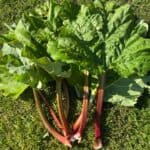How To Freeze Rhubarb
Learning how to Freeze Rhubarb with these step-by-step instructions, is a great way to preserve this seasonal fruit and enjoy it throughout the year. Don't let this delicious fruit go to waste!
Servings: 2
Calories: 32kcal
Equipment
- 1 Freezer bag or container
- 1 large tray
- 1 small sharp knife
- kitchen paper or clean tea towel
- 1 Label
- 1 Marker Pen
Ingredients
- 300 grams large or several small stalks of Fresh Rhubarb approx 300g when cleaned and cut into chunks.
- Water for blanching the rhubarb (optional)
Instructions
- Step 1 Wash and Trim: Top and tail the stalks removing all the leaves which are not edible. Then wash and clean them to remove any dirt. TIP - Compost the leaves.
- Step 2: Cut into pieces: Cut the stalks into chunks about 3cm approx 1 inch in size. Tip: Get a rough idea of weight and make a note on a label or on the freezer bag.
- Step 3: Blanch: Have ready a pan of boiling water. Take it off the heat and place the chunks into the hot water. Leave for no more than a minute or two. Any longer and you will begin to lose the flavour and the ends will begin to curl.
- Step 4: Cool: Carefully remove the Rhubarb from the pan of hot water and place it in a large bowl of ice cold water. This is to stop the cooking process and quickly cool down the Rhubarb and will help preserve the colour, flavour and texture.
- Step 5: Drain and Dry: Drain the Rhubarb and pat dry on kitchen paper or a clean tea towel. Note: Removing as much excess water as possible will prevent additional frost from forming in the freezer bag.
- Step 6: Freeze: To open freeze Rhubarb, place the chunks on a large flat tray or dish and place the tray in the freezer for a couple of hours or until the Rhubard has completely frozen. Note: Open freezing this way prevents the chunks of Rhubarb from sticking together.
- Step 7: Pack and Label: Remove the frozen Rhubarb from the freezer and place the chunks in a prepared freezer bag or container, removing as much air as possible if you can. Remember to add a label. Place the bag of frozen Rhubarb back into the freezer.
How To Freeze Rhubarb without Blanching
- Follow Steps 1 and 2 as above - Wash, Trim and cut into chunks. Remove the leaves and ends of the fresh stalks then wash and clean them to remove any dirt. Pat dry on kitchen paper or a clean tea towel. After cutting the stalks into chunks remember to weigh them and label your freezer bag or container.
- Follow Step 6 as above - Freeze. Place the rhubarb chunks on a large tray and place this in the freezer for a couple of hours or until completely frozen.
- Finally, follow step 7. Bag and Label. After removing the frozen chunks from the freezer you can now place them in your freezer bag removing as much air as possible to help prevent ice crystals from forming.
Notes
Storage
Frozen Rhubarb will keep in the freezer for up to a year. See additional notes below in the FAQ section. When ready to eat, simply thaw in the fridge or at room temperature. HOW
Top Tips
Tip 1: Before blanching or freezing rhubarb, weigh it first. This way, it will be simpler to determine the required amount needed for any recipe.
Tip 2: Do not over blanch the Rhubarb or the edges will curl and you will lose some of the flavours.
How Long can you freeze rhubarb?
Frozen Rhubarb will last for up to a year in the freezer. Ice crystals and freezer burn can often form after a long period of time. By this time, it may have lost a lot of flavour and texture. So, mix it with other stewed fruits to make a pie rather than waste it.
Do you need to blanch Rhubarb before serving?
It is not essential to blanch Rhubarb before freezing, but it helps retain the fruit's colour, flavour and texture.
Nutrition
Calories: 32kcal | Carbohydrates: 7g | Protein: 1g | Fat: 0.3g | Saturated Fat: 0.1g | Polyunsaturated Fat: 0.1g | Monounsaturated Fat: 0.1g | Sodium: 6mg | Potassium: 432mg | Fiber: 3g | Sugar: 2g | Vitamin A: 153IU | Vitamin C: 12mg | Calcium: 129mg | Iron: 0.3mg
